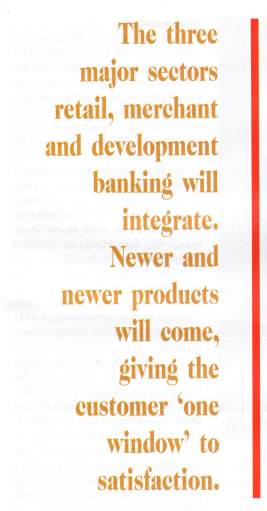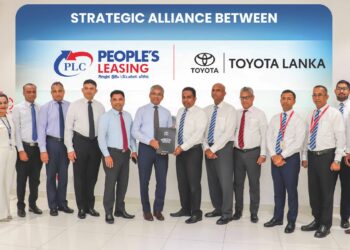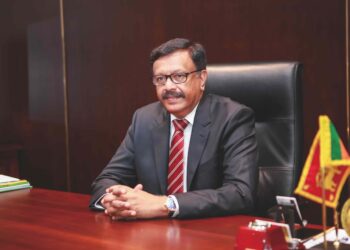• How did Mashreq Bank start out?
This was known as the Bank of Oman. It was incorporated in 1967 in Dubai. In 1993, when our new CEO, Abdul Aziz Abdulla Al Ghurair took over from his father he decided that we should establish our own identity. So we changed the name to Mashreq Bank. Our head-office is incorporated in UAE. Since 1967 we have established branches from New York right up to Hong Kong. In Sri Lanka we established a branch in 1980. We were originally at York Street but when the building was damaged we moved to our present premises. There is a staff of 46. Since 1980, we had the best year in 1996. It broke all the records in deposits, advances and profits. Earlier, we had three expatriate staff. Now, we don’t have expatriate staff except for me. I here in 1993. My first job was to educate and push my local staff higher. Today, my Credit Manager is Sri Lankan, my Marketing Manager is a Sri Lankan, my Operations Manager is a Sri Lankan and earlier all these posts were held by expatriates. It is important for us to develop the human resources. Our purpose is not to open a branch, make money and send money back. Mashreq feels that it’s an obligation to train the local staff, bring in expertise, introduce new technology and send the people from here abroad.

• How did you decide the five emerging markets chosen for your strategic investment plan?
First is Sri Lanka. Second is Pakistan. Egypt is number three, India is four, Qatar is five. Sri Lanka was chosen because of its geographical location, because the literacy rate is high. The cost of real estate is very low here. The rent for a square foot in Bombay s about US$12.78. in Pakistan it’s about US86, here it’s US$1.10 It’s the cheapest in the region. The climate is very comfortable. Travelling is easy compared to India, Pakistan…
According to Rahim Khanani, our Vice President and an expert on potential markets, Sri Lanka is all set for a boom. We believe that the present problems will be over with the space of time.
When you say an emerging market, it’s not only the foreign investments, human resources, technology, etc. As a financial institute you also look at control. We have met the Governer of the Central Bank and we are quite impressed with the way they monitor. After all a financial Institute is a custodian of people’s funds.
We have done our research and we have come to the conclusion that Sri Lanka is an emerging market and we want to concentrate on Sri Lanka.
• What part did the regional impact play in the choice?
America, Europe, Far East all these are matured. The next up-coming giants are going to be the Asians that is India, Pakistan, Sri Lanka…Sri Lanka may be a small country but because of its advantages and now with the USSR dismantled and Russian markets opening up, Sri Lanka can be a gateway to these countries. India has a population of over 900 million. That itself is a big market.
With the change of government in Pakistan, with the signals that India and Pakistan would like to work more closely we feel that the next up-coming giants will be the Asian countries Here, we are where Taiwan and Korea were fifteen years ago. We feel that Sri Lanka, maybe a small country. maybe a small population, but it can be a big springboard once these problems within and in the region are solved.
• How do you plan to restructure your Sri Lankan operations?
Our first priority is to build our own building. It will not only be housing the branch but it will also be a landmark reflecting our culture. We intend spending quite a big amount. We have recently opened a service centre in Pettah. We intend opening branches after the approval of the UAE Central Bank and sending more stall to Dubai for training.
• What are the new products you intend to launch?
Our first product is going to be ‘corporate guaranteed loans’. Today, a lot of companies feel that it is too much for them to do everything. They are busy doing their main thing. Staff loans, salaries… will be taken over by the bank. We look after staff financial activities. We have a product in Dubai called ‘Mashreq Millionaire’. It is a 1000 Dirham certificate which is encashable. A certificate holder automatically becomes eligible for a monthly draw of 10,000 Dirhams and a bumper prize of one million. Apparently, the last five draws have all gone to low income groups. This prize is a savings. You can encash it, or get a loan against it. Like this we intend to introduce savings products. Because the savings is a bit low in Sri Lanka compared to other countries.

• Are you planning to get into retail banking strongly?
Yes, we are. Our bread and butter is trade finance. We will get into that too.
• Compared to other countries the Sri Lankan earners can save very little. Do you feel that they can generate a sustainable segment of business?
Yes. People are becoming conscious these days. They feel that savings is important. They feel that taking loans is important as a hedge against inflation. The world is becoming smaller, exchange laws are deregulated, people know the importance of money, they are willing to work hard. I think all these together will push retail banking
More than 50% of Sri Lankans are employed. This is a good sign. And it is increasing Today, because salaries are low, it is a must for the husband, the wife and the child to go to work. This is a good .
• At present, there is a scenario of many banks entering retail banking. Wouldn’t it be a case of everybody going after the same piece of cake?
I read in an article which said that there should be one bank for every 2000 persons. In Sri Lanka, we have only one for every 7000 persons. So, there are still opportunities for us to expand. Only thing is that it should not be concentrated in Colombo. It should spread When Pakistan opened up the banking system, they said “we’ll allow you to open up one branch in the main city, the others you have to open up in the suburbs. When a bank is opened in a village. people get employment there, people start saving, the bank starts funding. The successful recovery rate is there in the villages. They found out that by opening banks in the rural areas there was more employment, infrastructure development less influx to the cities from the villages.
• Do you love plans of going out of Colombo?
Not in the near future. We intend first to consolidate ourselves here before moving down South or to the centre. We have at the back of our minds two places – Galle and Kandy.
• Technologywise what do you intend to introduce?
We intend to be on-line with our head office from next year. We intend to introduce many packages which would cut down paper work and procedures. The PC will play a vital role in our decision making. We will be accessible to our customers from home or from anywhere else through a phone link.
• Do you feel that Sri Lanka is ready for such an advancement?
Yes. Because like any country when new things are introduced there will be bureaucracy. People minds have to change or eventually it catches up. It is a matter of time and education. And once people realize that these facilities will cut down paper work, are less of a hassle, then they will get used to it. It’s a matter of time.
• In Sri Lanka what are the areas you feel that banks should play a more active role?
I think that banks should play a more prominent role in infrastructure development like power plants,roads. Foreign banks should be encouraged to participate. Given incentives to bring in investors. International banks have branches around the world. They should be used as an avenue because infrastructure is one of the most important elements that an investor looks into.
We feel that Sri Lanka should attract more Arab investors. This they lack at the moment. We feel that this potential should be tapped.

• Does Mashreq plan to play a middle-man role here?
Yes, we are talking with our Ambassador in UAE. Mr Samsudeen. In the last couple of years awareness of Sri Lanka has grown over there. There is going to be a fair in Sharjah in September. We are talking to our customers that they should participate.
We also have an intention, which is my dream, that is to open a Sri Lankan window’ in Dubai to help Sri Lankans to remit money. At the moment we are shifting Rs 2.3 billion into Sri Lanka. We have two or three Sri Lankans there especially for this.
The reason for this ‘window’ is that there are a lot of Unit Trusts here who sell to people who like to participate in the stock exchange. We would like to be agents to some of these Unit Trusts over there. The expatriates’ savings will be increased. We are also talking to Richard Peris & Co. to arrange the purchase of autos for the Sri Lankan expatriates through their savings. These are things that we have in our mind.
• When would these plans be implemented?
It will take time. My first task is the premises. By one and a half year’s time we should have the latest software. Human resources development we have already started. Consumer banking should come into the market by the third quarter of 1997. So, we have already started.
Turning to the international scene, there seems to be a perception that the domestic environment is not very conducive to investments. In such an environment why has Mashreq decided to go against the herd?
When things are good and fine then to go in would mean either You are too late or you have missed the best opportunities. It is better to go in when things are not so good.
Show me a country which does not have trouble. At the Atlanta Games there was a bomb. The only difference between here and there is a difference in projection.
There it is projected positively as soon as the bomb went off ambulances came, so and so did a good job…Here, when things happen it is projected as if the whole of Colombo is burning down.

We feel that these troubles come and go. The main things are, the controls of the Central Bank are good, the macro economic policies are good and political stability will come with time.
Today, when you invest you have to take the bad things into consideration too. We take all this as a part of the package. And we are ready to accept it A lot of investors are sitting on the fence. They are just waiting till things change. But then if you come with them you are just another figure, another number. We want to be leaders
• Is enough being done to project Sri Lanka positively?
Yes, people are realizing the importance. The BOI is signing a lot of projects. I think some of the top people are now playing an important role in attracting investments
• So, bureaucracy has changed?
To a certain extent. But a long way to go still.
• Still, there are bottlenecks?
There are, No doubt about that. There are certain things that need to be changed. But then Rome was not built in one day.
• What are the inherent advantages that Sri Lanka has in attracting investments?
Geography. Sri Lanka can work with the East and also with the West. The country is small with a limited population, hard working high rate of literacy, good climatic conditions… Unlike a lot of others who feel that the local human resources, to say the least, are complacent, you tend to have a high regard.
I see a lot of potential. It is a matter of grooming them, counselling them, advising them and giving them opportunities. In the past the system has been that wherever investors go, they try to bring in their own people. The locals are not given an opportunity. Even in our Dubai office we have so many Sri Lankans and they are doing a far better job than the rest.
• Your Vice President Rahim Khanani stressed the fact that the culture of “pay for performance’ should be introduced to Sri Lanka. Do You feel this is being that this is done?
Yes. But we should bring this into the government machinery. The government should start this then it will trickle down. Today, it’s ‘pay for performance, you do something you are rewarded, if you are rewarded you are motivated, if you are motivated you have an inner urge.
We should bring in this concept. It should come in the government. And I feel that the government is doing a good job with d these liberalization policies A government’s business is not to run business.
• How do you foresee the next 10-15 years. for Sri Lanka?
I think with the new developments in the stock market, with other foreign banks coming in Sri Lanka will solve as me of the best financial hubs in Asia.
We are going to have a forex congress here by this year end. This will help us exchange ideas. We are in a transition period.
Our minds are changing, younger and younger people are coming in. The government, bureaucracy is coming down slowly, government is coming out of running business. Only thing is that the defence spending is high, but once this problem is solved and all that money is spent on development. this country can boom. the population growth is 1.4. Things can be controlled, things can be implemented
• How will the banking sector change?
The three major sectors retail merchant and development banking will integrate. Newer and newer products will come, giving the customer ‘one window’ to satisfaction. higher purchase loan to the staff, trade finance, syndicating…all will under one roof. When a customer gets all the facilities available from all banks he is in a better position to judge.
• Is the Sri Lankan population prepared for such a change?
I think we are well equipped in Colombo, and in the other major cities we are OK. But we need to create awareness in most other areas that people should participate in banking more and more. Today, banks offer various kinds of services. They do fund management, they look into the project and give advice, there is so much of expertise coming up. Mashreq is gearing to play its role 1996 was Mashreq’s best year in Sri Lanka. We want to make Mashreq. Colombo, a mode branch We have international branches from New York onwards where everything is available, But we chose Sri Lanka weighing.all the pros and cons and we found out that Sri Lanka was the best place to start out





